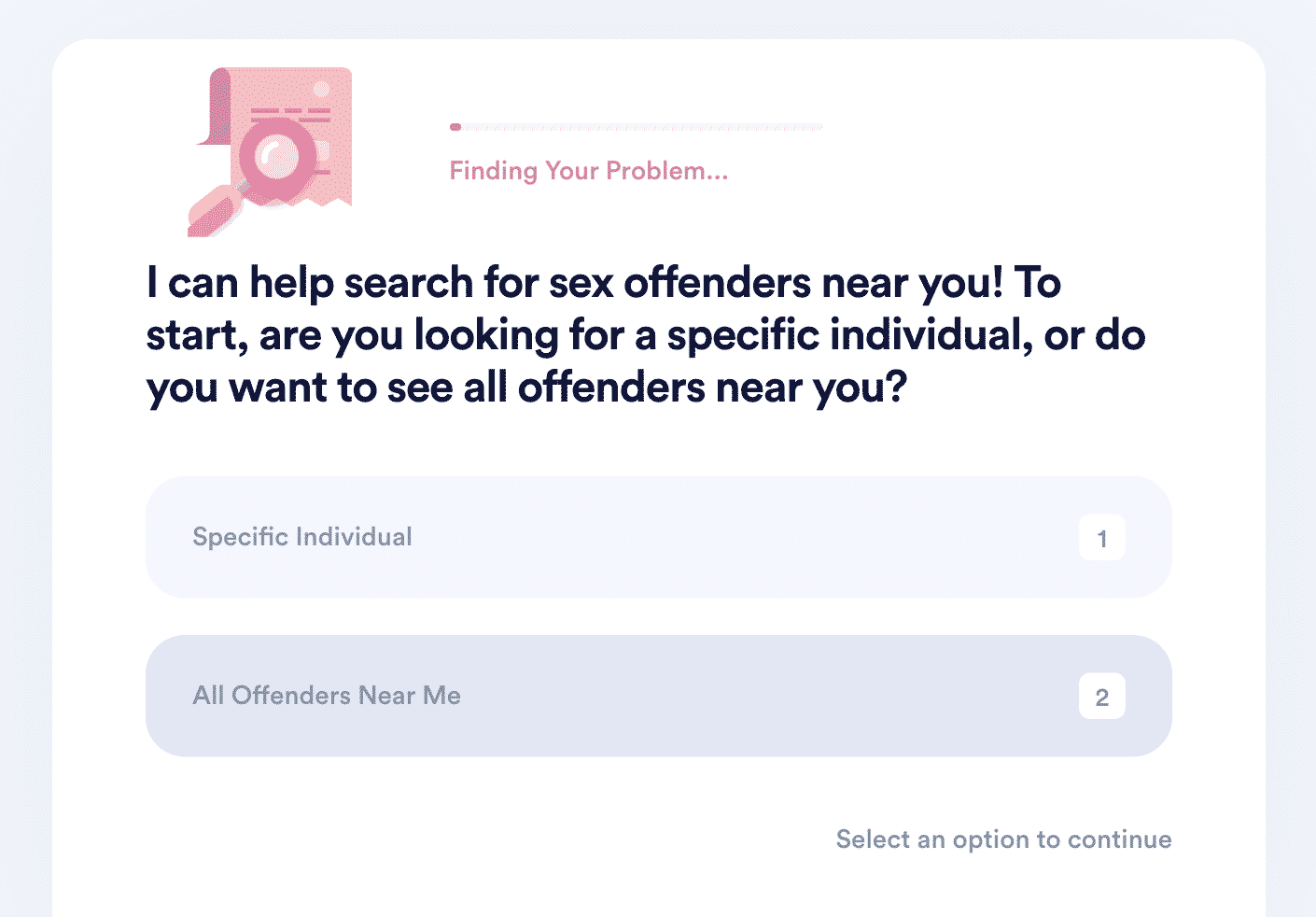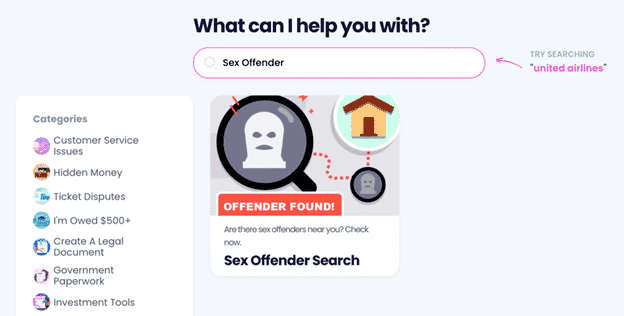The Characteristics of a Pedophile Explained in Depth by DoNotPay!
Pedophiles prey on the most vulnerable among us—children who can’t protect themselves easily.
Among sex offenders, pedophiles are the most reviled and justly receive the harshest punishments.
DoNotPay is here to help you protect your family by examining the characteristics of a pedophile and letting you know what you can do to make sure you stay safe!
What Is a Pedophile?
A pedophile is someone who preys on minors for sexual gratification.
Although pedophilia is classified as a mental illness, acts perpetrated by pedophiles are among the most serious sex offenses committed.
There are two distinct types of pedophiles, namely those who target:
- Pubescent minors
- Prepubescent children
Pubescent Minors
In medical terms, people who target minors aged 12–15 are considered hebephiles, but the law considers them pedophiles.
Prepubescent Children
Some pedophiles are aroused by the prospect of sexual contact with children below the age of 12. Such cases are normally treated as considerably more serious under state and federal law.
What Is the Profile of a Pedophile?
It is impossible to tell if someone is a pedophile from their outward appearance.
The truth is that pedophiles look like everybody else, with no distinguishing visible characteristics. They are best defined by their behavior and attitudes, meaning that certain traits may be indicators that someone is a pedophile.
These traits have been defined using criminal profiles, so they only reflect pedophiles that have been caught, tried, and convicted.
Criminal evidence suggests that pedophiles are:
- Predominantly male
- Generally over 30
- Often single and with few age-appropriate friends
This does not mean that all single men over 30 are potential pedophiles. A pedophile’s behavior is a more reliable indicator of any danger.
How Does a Pedophile Behave?
Pedophiles target minors, which means that much of their behavior will reflect their desire to be close to their victims.
Typical pedophile behavior can include:
- Socializing predominantly with minors
- Treating minors as adults in conversation
- Favoring age-inappropriate hobbies
- Seeking employment or volunteer opportunities that bring them into contact with their targets
None of these behaviors alone is a surefire indication that someone is a pedophile. A combination of suspicious behavior and the correct profile may be enough to justify more scrutiny, though.
How Does the Law Treat Pedophiles?
Convicted pedophiles often face harsher punishment than sex offenders who commit crimes against adults.
Sex offenses with minors are among the most serious crimes on the statute books and are considered to be:
- Tier or level II for crimes involving pubescent minors
- Tier or level III for offenses with prepubescent victims
Sentences for sex crimes against minors can be as high as 30 years in jail, depending on the state in which the crime was perpetrated.
Even after they have completed their punishment, pedophiles—in common with all sex offenders—are not considered rehabilitated. After being released into society, pedophiles have to place themselves on their state sex offender registry for a period of:
- 25 years for tier II crimes
- Lifetime for tier III offenses
Each state’s sex offender registry aims to allow authorities to map the whereabouts of convicted sex offenders. Under the terms of the 1996 Megan’s Law, this information is also accessible by the general public.
What Does Being on a Registry Mean for a Pedophile?
Being on their state’s sex offender registry has massive implications on the life of a convicted pedophile.
Registration imposes severe restrictions on many aspects of sex offenders’ lives, including:
- Where they can live—Pedophiles—like all sex offenders—may not live within a certain distance of any facility where children congregate. The distance ranges from 500 to 3,000 feet, and the restrictions apply to:
- Schools
- Playgrounds
- Childcare facilities
- School bus stops
- Gymnasia and sports facilities
- What jobs they can perform—Convicted pedophiles may not perform any job or volunteer work that brings them into contact with children. This ban remains in place as long as they are on the sex offender registry
- Where they can travel—Many states require convicted sex offenders to register in any state they travel to, and international travel may be subject to entry bans in some countries
Convicted sex offenders must keep their records updated to reflect any changes of address or employment—unregistered sex offenders face severe punishment when caught.
What Can You Do if You Suspect Someone May Be a Pedophile?
If you are worried about your children becoming victims of a pedophile, or if you are suspicious of someone in your neighborhood, you should:
- Talk to your family to voice your concerns
- Set geographical boundaries for your kids
- Explain the dangers to your children in age-appropriate language
- Make sure your caregivers are in the loop
- Report your suspicions to law enforcement authorities
The most important check you can perform is to search your state sex offender registry to see whether any convicted sex offenders live in your neighborhood.
This is where DoNotPay can help—we can if you choose!
How Can DoNotPay Help Protect You From Pedophiles?
DoNotPay values your and your kids’ safety, so we are here to help you check for pedophiles in your area!
Our Sex Offender Search feature allows you to check a radius around your address for registered sex offenders, look for a specific offender to determine their whereabouts, and set up weekly updates, so you don’t miss any developments.
Here’s how to use our feature:
- in your web browser
- Click on our Sex Offender Search feature
- Choose whether you want to search for:
- A particular person
- Sex offenders in your vicinity
Once we know what you’re looking for, we will send you a report in an instant—you can also choose to receive weekly updates to keep you in the loop.

DoNotPay’s Guides to State Laws
DoNotPay has detailed information on how the sex offender registry works in most states—here are some examples:
| Virginia | Kentucky | Illinois |
| Texas | Michigan | Wisconsin |
| Georgia | Utah | North Carolina |
| Indiana | Ohio | California |
| Pennsylvania | New York | Missouri |
| Iowa | Tennessee | Florida |
DoNotPay Makes Administrative Hurdles a Piece of Cake
If you ever needed to deal with an administrative task, such as drafting a valid document or paying property taxes, you know that it’s a struggle. The good news is—it doesn’t have to be!
With a bit of assistance, you can draft a POA document and learn how to reduce your property taxes in a jiffy!
DoNotPay will also show you how to tackle any of the following tasks like a pro:
- Get your documents notarized
- Protect your work from copyright infringement
- Get crime victims compensation
- Send Demand Letters To any company in small claims court
- Send your fax online without a faxing machine
- Create passport photos
- Fight workplace discrimination
- Apply for a college fee waiver
We Offer More Helpful Tools!
Helping you deal with bureaucratic hurdles isn’t everything we got in store for you! DoNotPay boasts various other nifty tools that you can use to deal with everyday tasks. You can:
- Request compensation for missed or delayed flights
- Jump the queue when contacting a customer support rep
- Cancel any unwanted subscription
- Learn how to use a virtual credit card
- Sign up for free trials
- Get a free raffle ticket
